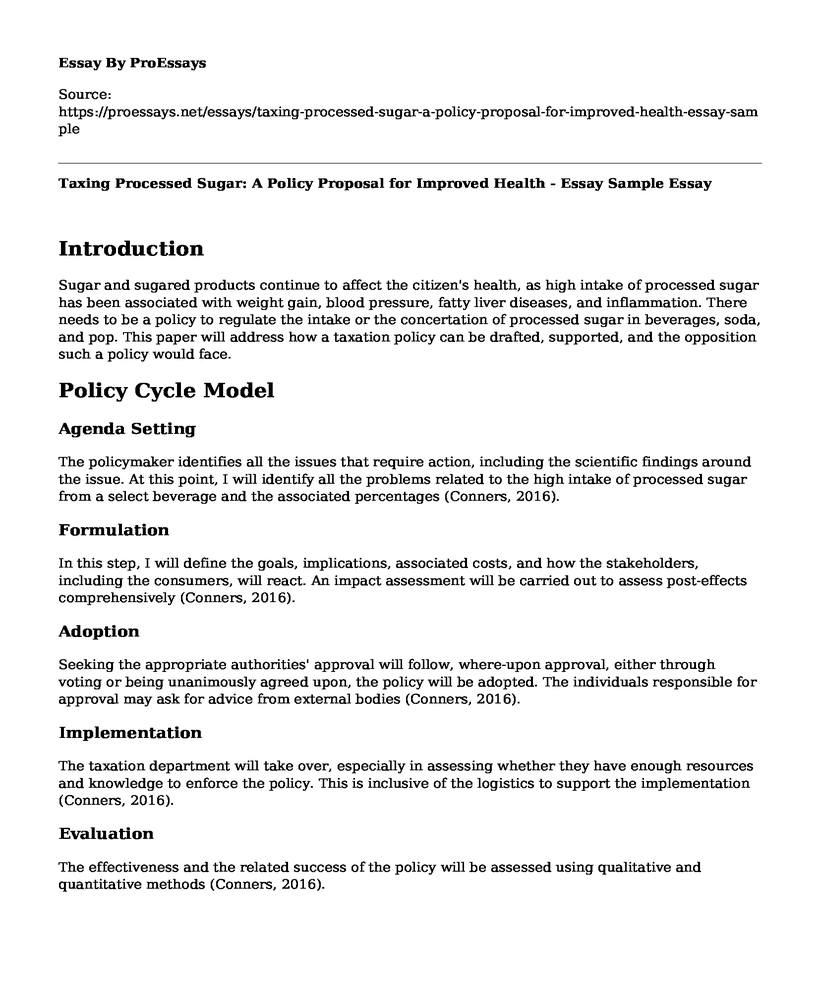Introduction
Sugar and sugared products continue to affect the citizen's health, as high intake of processed sugar has been associated with weight gain, blood pressure, fatty liver diseases, and inflammation. There needs to be a policy to regulate the intake or the concertation of processed sugar in beverages, soda, and pop. This paper will address how a taxation policy can be drafted, supported, and the opposition such a policy would face.
Policy Cycle Model
Agenda Setting
The policymaker identifies all the issues that require action, including the scientific findings around the issue. At this point, I will identify all the problems related to the high intake of processed sugar from a select beverage and the associated percentages (Conners, 2016).
Formulation
In this step, I will define the goals, implications, associated costs, and how the stakeholders, including the consumers, will react. An impact assessment will be carried out to assess post-effects comprehensively (Conners, 2016).
Adoption
Seeking the appropriate authorities' approval will follow, where-upon approval, either through voting or being unanimously agreed upon, the policy will be adopted. The individuals responsible for approval may ask for advice from external bodies (Conners, 2016).
Implementation
The taxation department will take over, especially in assessing whether they have enough resources and knowledge to enforce the policy. This is inclusive of the logistics to support the implementation (Conners, 2016).
Evaluation
The effectiveness and the related success of the policy will be assessed using qualitative and quantitative methods (Conners, 2016).
Support and Maintenance
At this stage, studies will be conducted on how the policy might be amended, improved, or developed to provide any additional support for its continuation. At this point, the policy can also be done away with, if deemed redundant or ineffective. External bodies, especially the scientific ones, might be involved to continually provide feedback and updates on the weaknesses to help maintain or improve the policy (Conners, 2016).
My argument for the implementation of the policy is that, to some extent, sugar, especially natural sugar, is good for our health while taken in measured quantity. However, the side effects associated with processed sugar are detrimental to an individual’s health. The consumption of sweetened beverages has been associated with the rising cases of obesity, and overweight, which are the risk factors of other chronic conditions (Malik et al., 2006). Thus, introducing a tax policy on these beverages will cause the manufacturers to reduce the sugar in the drinks or set the prices high to realize profits. Reducing sugar content will be beneficial in that individuals will consume less sugar. On the other hand, setting the prices high will make the beverages unaffordable, thus reducing the intake and the overall effect.
The opponent to the proposal might raise the unemployment concerns as the sugar farms, and the companies will have less revenue. This impact will lead to them taking extra measures like discontinuing some workers. Another argument might be that the factors mentioned above can be caused by other factors like fat intake and wheat product consumption. I will provide the available statistics of the adverse effects resulting from the consumption of these products, as well as how the impacts such implementation such will have upon adoption. I will also mention the economic gains my community gets from the sugary beverages and how the health effects outdo the benefits (Malik et al., 2006), thus gaining the requisite support. The stakeholders I will involve are the government, researchers, medical professionals, and beverage company representatives.
Conclusion
A policy is a principle or a course of action, implemented or proposed by an authority. Policies have a cycle it follows from the Agenda Setting, Formulation, Adoption, Implementation, Evaluation, Support, and Maintenance (appendix). Policies share standard features such as, they shape principles and laws, states and influence the actions, and lastly, policies are authoritative statements that are promoted by a person or a body mandated to do so.
References
Conners, S. (2016, September 14) GeoPolicy: Science and the policy cycle. GeoLog. https://blogs.egu.eu/geolog/2016/09/14/geopolicy-science-and-the-policy-cycle/
Malik, V. S., Schulze, M. B., & Hu, F. B. (2006). Intake of sugar-sweetened beverages and weight gain: a systematic review. The American Journal of Clinical Nutrition, 84(2), 274–288. https://www.ncbi.nlm.nih.gov/pmc/articles/PMC3210834/
Cite this page
Taxing Processed Sugar: A Policy Proposal for Improved Health - Essay Sample. (2023, Aug 10). Retrieved from https://proessays.net/essays/taxing-processed-sugar-a-policy-proposal-for-improved-health-essay-sample
If you are the original author of this essay and no longer wish to have it published on the ProEssays website, please click below to request its removal:
- Plans in Creating Public Health Campaign Paper Example
- Superdrug Digital Transformation - Research Paper
- Essay Sample on CVS Pharmacy: Understanding Customer Expectations
- Essay on Neisseria Meningitis: Deadly Pathogen-Host Interaction
- Essay Example on U.S Medical Care Organization: A Case Study
- COVID-19 Impacts: Cancer, HIV/AIDS Treatment Hit Hardest - Research Paper
- 32-Year-Old Man Diagnosed With Myocardial Infarction - Report Example







